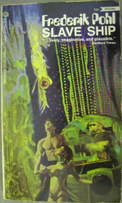
| Publisher: | Ballantine |
| Copyright: | February 1957 |
| Printing: | October 1969 |
| Format: | Mass market |
| Pages: | 147 |
I picked this book up at a used bookstore mostly to see how Pohl, one of the better and more literary authors of his era, could handle a novel with a title and cover promising the more lurid end of pulp. It turns out he does so by writing a story that has nothing to do with either.
The cover features an ape in a bubble-shaped something that looks like an exploration vessel, a scantily-clad woman with a metal collar, and a bare-chested man looking up in some unclear emotion at an eyestalk descending from a lurid green mass of worms. None of these people, places, settings, or ideas appear in this book, and I completed the novel without catching a whiff of the promised ship of bondage. I suppose, at a stretch, it might refer to the training of animals for military missions, but if that was the intended connection, it was never made in the text of the story. I hope the people who bought the book based on its marketing were satisfied; what they actually got was a very odd and possibly ironic war novel.
At the start of the book, Lieutenant Miller is whisked from his post on a submarine (although in this future, all ships appear to be submarines, including carriers, raising interesting logistical questions left entirely unaddressed) to a military base that's oddly obsessed with livestock. He's then left to cool his heels surrounded by baffling secrecy. On his way, he witnesses the sudden and improbable death of another officer. Later, he discovers that this, the Glotch, is an ominous new turn to the ongoing world war. People are dropping dead left and right, well back from enemy lines, apparently the result of a new weapon. After a random mishmash of events, Miller is of course sent to infiltrate the enemy base presumed responsible, using the results of the strange animal research.
The background is a world war against not a country but a religion, one that uses terrorism as well as conventional military operations. Despite being from Southeast Asia and having their own nuclear weapons (and hence preventing a fatal strike through the standard mutual assured destruction), the enemy seems eerily prescient. The Caodais (actually Đạo Cao Đái, not that the book would tell you that or that the publisher at the time would probably have been able to print that) are, however, a real religion, partly responsible for the expulsion of the French from Vietnam (although very peaceful these days). Pohl's treatment bears little resemblence except in name and titles; except at the very end of the book, they're treated as faceless presumed villains. Miller is not in direct contact with the enemy for most of the book, so mostly the reader sees only captives and standard wartime racism. The focus is instead on the mysterious killing Glotch and on the animal training.
Besides being set in a future that features telepathic phone calls of sorts and amusing submarine warfare (let's just say it's not The Hunt for the Red October), the SFnal element of the book is communication with animals. It's taken for granted that animals have languages of some small number of words and that humans can speak those languages, and the good guys are starting to use that to train animals as soldiers. This becomes obvious to the reader in short order even if it takes Miller some time to figure it out. His run-ins with close-mouthed military bureaucracy and strange experiments, and his pairing with a Russian dog lover (Russia is an ally against the Caodai threat), occupy much of the book. Judging from the afterword, Pohl was very interested in animal language and in the implications for closer links between humans and animals than humans thought, but in the book it's just more things that happen along the way.
Slave Ship is frankly rather incoherent. I'd like to say it's a merger of Dr. Doolittle and Catch-22, but while those are the sorts of ideas that went into it, Pohl never puts together a coherent whole. The treatment of military bureaucracy has got to be satirical, as does Pohl's treatment of total war (currently, manicurists are being drafted since the Boy Scouts were pressed into service some time ago). The ending also takes a sharp anti-war twist. But the overall impression is more whimsical than biting, and psychic powers, animal communication, pacifist terrorists, and Miller's quest to rescue his wife from a North African Caodai concentration camp are all thrown into the plot blender. The twist ending shakes off unused plot elements like a wet dog. Combine that with the baffling title and the bizarrely disconnected cover and the whole experience is surreal.
Pohl has written much better books, but he still shows glimmers of why he stands above most of the pulp writers of the era. His imagined world betrays 1950s markers, but rather fewer than one might expect (sexism, for example, is kept down to a dull roar compared to some of his contemporaries), and of all the imagined war opponents of the 1950s, this one has possibly aged the best. Despite the lack of overall thematic coherence, I admit to liking the ending. A downright odd book, inferior to Pohl's better known works but worth a look as a surreal break between modern 700-page monsters.
Reviewed: 2007-07-15